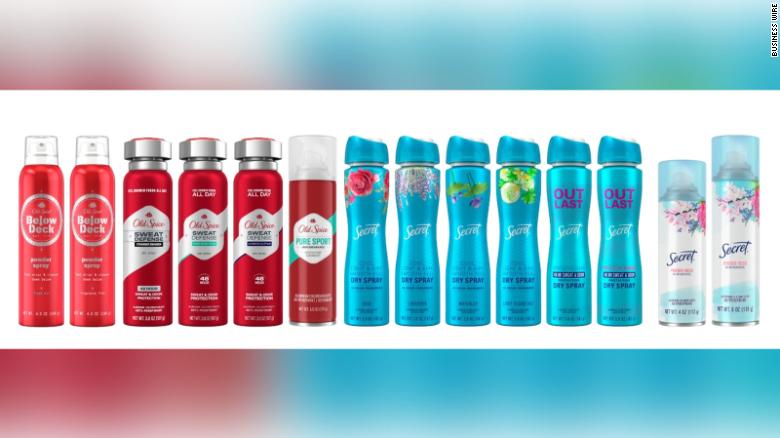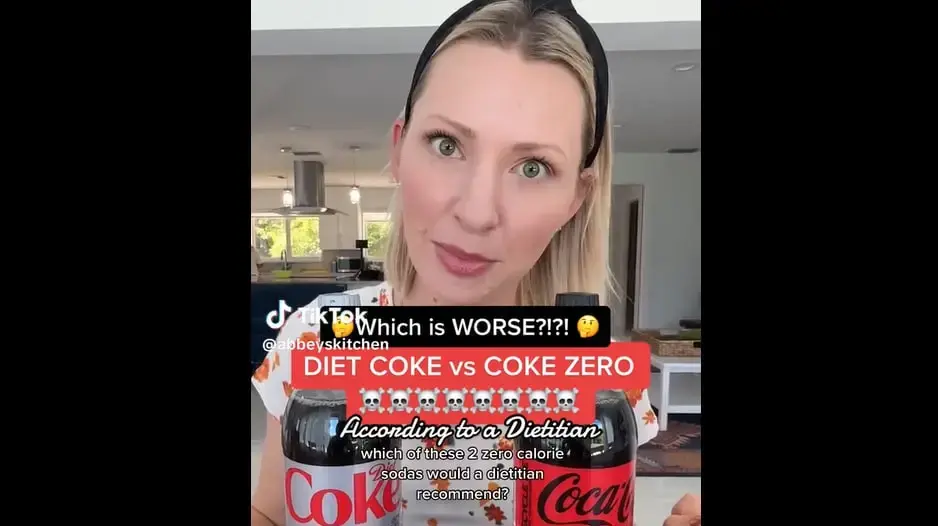The P&G company voluntarily recalled 17 products from the market due to the discovery of benzene, a carcinogenic chemical.
(CNN) -
Benzene, a chemical known to be carcinogenic, is present in more than half of 108 batches of antiperspirant and deodorant body sprays from 30 different brands, according to a citizen petition filed this month with the Food and Drug Administration. US Medications (FDA).
Benzene should not be used in the manufacture of pharmaceuticals or substances because it is a class one solvent with "unacceptable toxicity," according to the FDA.
However, the FDA allowed a "temporary" use of benzene in liquid hand sanitizers during the pandemic, setting the upper limit at 2 parts per million.
The US Environmental Protection Agency set a much lower limit of 5 parts per billion (ppb) for benzene exposure in drinking water.
The agency has also set a "target of 0 ppb for benzene in drinking water and in waters such as rivers and lakes, because benzene can cause leukemia."
Last week, "as a precaution," manufacturer Procter & Gamble voluntarily recalled 17 different types of Old Spice and Secret antiperspirants from the shelves, according to a press release.
Voluntary recall of Old Spice and Secret body sprays
Old Spice High Endurance AP Spray Pure Sport
Old Spice Hardest Working Collection Invisible Spray Stronger Swagger
Old Spice Hardest Working Collection Invisible Spray Pure Sport Plus
Old Spice Hardest Working Collection Invisible Spray Stronger Swagger
Old Spice Hardest Working Collection Spray Invisible Ultimate Captain
Old Spice Below Deck Powder Spray Unscented
Old Spice Below Deck Powder Spray Fresh Air
Secret Aerosol Powder Fresh Double Pack
Secret Aerosol Powder Fresh
Secret Fresh Collection Invisible Spray Water Lily
Secret Fresh Collection Spray Invisible Lavender
Secret Fresh Collection Spray Invisible Light Essentials
Secret Fresh Collection Invisible Pink Spray
Secret Outlast Invisible Spray Completely Clean
Secret Outlast Invisible Spray Protecting Powder
Old Spice Pure Sport 2021 Gift Set
** All have an expiration date prior to September 2023.
advertising
Other brands, such as the Tag, Sure, Equate, Suave, Right Guard and Brut batches, which had benzene levels equal to or greater than 2 parts per million, have not yet been recalled, said David Light, CEO and founder of Valisure, the independent laboratory that performed the tests and submitted the petition.
Other batches of antiperspirants and deodorants that Valisure said had levels of up to 2 parts per million include products from Summer's Eve, Right Guard, Power Stick, Soft & Dri and Victoria's Secret. To date, CNN has not been able to verify that any of these products, except Old Spice and Secret, have been recalled following Valisure's application in early November submitted to the FDA.
CNN contacted all of these companies for a response.
The Village Company, which makes Soft & Dri, declined to comment.
Unilever, which makes Suave, told CNN in an email: "Unilever takes all safety concerns very seriously, and we are conducting a robust investigation into the claims in Valisure's petition for two Suave antiperspirant sprays." .
CNN received no response from the rest of the brands prior to publication, but the Personal Care Products Council (PCPC), an industry association that speaks on behalf of 600 consumer product companies, issued This statement.
"Benzene is not an intentionally added ingredient in body spray products; however, the US Food and Drug Administration (FDA), as well as product manufacturers, are aware that it may be present in food and pharmaceutical products at very low levels, "wrote the PCPC.
"The PCPC and its member companies are firmly committed to ensuring that consumers have access to cosmetics and personal care products with ingredients that have been thoroughly tested for safety and follow the requirements of the law," the statement said.
"Companies and individuals have a legal responsibility to ensure that their products and ingredients are safe for their intended use."
Two lots of metformin, a drug for type 2 diabetes, are recalled due to contamination with a possible carcinogen
Detect high levels of benzene
Benzene is created through natural and artificial processes.
According to the US Centers for Disease Control and Prevention (CDC), this chemical, which can trick the body's cells into not working properly, is also a natural part of oil. crude oil, gasoline and cigarette smoke.
It is also used to make various "plastics, lubricants, gums, dyes, detergents, drugs, and pesticides," according to the American Cancer Society.
Exposure can be dangerous, increasing the "risk of developing leukemia and other blood disorders," according to the National Cancer Institute.
Exposure to high levels of benzene in the air can be fatal, and if "benzene is spilled on the skin, it can cause redness and sores," according to the Agency for Toxic Substances and Disease Registry (ATSDR). ).
"Benzene in the eyes can cause general irritation and corneal damage."
In its recall, P&G said it has had no reports of adverse reactions, adding that "daily exposure to benzene in recalled products at the levels detected in our tests is not expected to have adverse health consequences."
However, testing by Valisure found worrying levels of benzene in some batches of P&G products.
The most contaminated, two batches of an Old Spice antiperspirant called Pure Sport (batches 11671458SQ and 11671458SB; UPC 012044001912), contained 17.7 and 17.4 parts per million of benzene on average, said Valisure CEO David Light.
"That's almost nine times the upper limit of 2 parts per million that the FDA has set for emergency use," Light said.
Secret Powder Fresh Aerosol, 24 HR (lots 11721458SG and 11701458SH; UPC 037000711087) averaged 16 parts per million, based on testing.
"In the case of sprays, they may be used every day, probably in an enclosed space, like a bathroom," Light said.
The company tested the product with the highest levels of benzene (Old Spice Pure Sport, at 17.7 ppm) in an enclosed bathroom, spraying once under each arm as a consumer would.
Doing so "could bring the air in the entire bathroom to 15 times the limit of what the EPA has said is an increased risk of leukemia," Light said.
What is HIV / AIDS and how is it transmitted?
Here are some basic facts and chronology of the fight against the virus
How is the product contaminated?
In general tests, benzene levels varied greatly from batch to batch, even within the same brand, Valisure noted, while initial analysis of at least a sample of 49 batches of body sprays from 19 different brands showed nothing. of benzene.
In total, "24 batches of body spray products from 8 different brands contained between 2.24 and 17.7 ppm of benzene; 14 batches of 8 brands contained detectable benzene between 0.20 and 1.89 ppm; and 21 batches of 8 brands contained detectable benzene at <0.1 ppm, "Valisure said in a press release.
According to experts, none of the products contain benzene as an ingredient, so the only way the chemical could have been introduced is through an error in the manufacturing process, or the way the chemical reaches the organism.
Valisure said one possibility is that the benzene could come from ingredients like hydrofluorocarbon 152a, butane, isobutane, propane and alcohol used to propel the sprays onto the skin.
"Our investigation showed that the traces of benzene came from the propellant spraying the product out of the can," said Kate DiCarlo, Senior Director of Communications for P & G's personal care portfolio.
"Due to the highly specialized nature of aerosol products, we use a manufacturing partner for these products," continued Dicarlo.
"That manufacturing partner identified a problem with its propellant supply and is implementing additional measures to address the problem identified in the investigation."
"After the recall is complete, we are preparing to ship new products that meet our quality standards to restock the shelves."
Johnson & Johnson Recalls Some Neutrogena and Aveeno Sunscreens After Detecting Benzene
Other benzene products
Is avoiding propellants in aerosol products the answer to reducing risk?
Possibly, experts say.
However, Valisure also found higher levels of benzene in non-aerosol body-wear products, including powders and sticks, Light said.
"I think there is good evidence that propellants are a significant source of this contamination, but there are also a variety of potential sources in the raw materials used to create the products," Light said.
"Impurities can be present in the manufacturing environment due to the use of certain chemicals, equipment or containers. We need more testing," said David Andrews, lead scientist with the Environmental Working Group (EWG), an non-profit group for the defense of the environment and consumer health.
"We need independent analysis as part of the global supply chain. It is very important to detect these problems before they hit the shelves," added Light.
Benzene has also been found in other consumer products.
The FDA warned consumers not to use certain hand sanitizers early in the pandemic due to high levels of this solvent, and this summer Johnson & Johnson (J&J) voluntarily recalled four brands of Neutrogena sunscreen and one from Aveeno after that Valisure's lab found alarming levels of benzene and filed a petition with the FDA.
CVS Health and Coppertone also voluntarily stopped selling various sunscreen and sunscreen products due to similar findings.
But Light said that, as far as he knows, other sunscreens and post-sun cosmetics, which also tested positive for the toxin, are still on the market.
"There is no safe level of benzene that can exist in sunscreen products," Dr. Christopher Bunick, associate professor of dermatology at Yale University, said in a press release at the time.
"Even the 0.1 ppm (parts per million) benzene in a sunscreen could expose people to excessively high amounts of nanograms of benzene."
Choose the safest sunscreen for your family with this 2021 guide
However, the vast majority of sunscreens tested did not contain benzene, and experts stress the importance of using sunscreens to protect skin from aging and the carcinogenic effects of the sun.
The sunscreens analyzed by Valisure were just a small sample of the more than 11,000 registered sunscreen products on the market.
In response to Valisure's petition about sunscreens, the FDA told CNN that it "evaluates and assesses the information provided in citizen petitions of this type and generally initiates an independent testing and verification process."
Merchandise withdrawal







/cloudfront-eu-central-1.images.arcpublishing.com/prisa/GXCNZ4EZL7W46CE4OBDBCILZVE.jpg)
